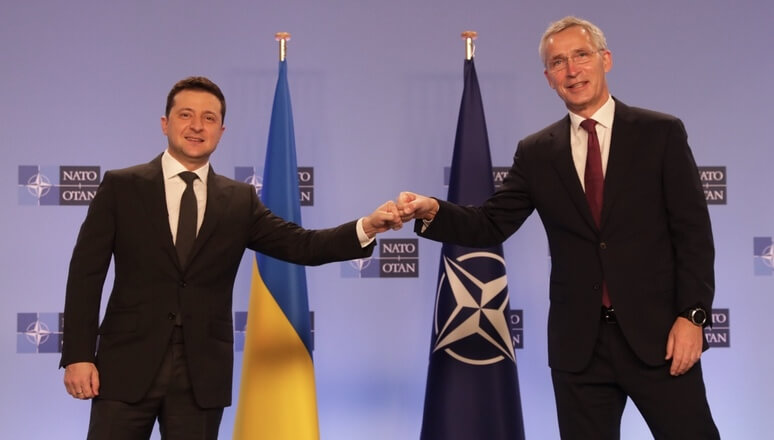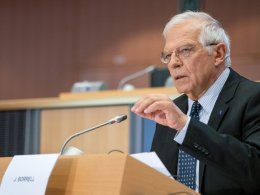As Russia’s invasion into Ukraine continues and the United States, along with its European counterparts, scramble to respond to Russian aggression, many are wondering about NATO’s role in this conflict.
Ukraine in the past suggested that it would like to have become a member of the North Atlantic Treaty Organization (NATO), but presently, they are not members. Some analysts point out that because Ukraine lacks NATO membership, the alliance's Article 5 collective defense clause does not warrant NATO troops to come to their aid against the Russians.
Others point out that NATO countries bordering Ukraine like Poland, Hungary, Czech Republic, Slovakia,Bulgaria, and others are heavily affected by Putin's invasion, thus helping the Ukrainians protect NATO allies in the long term.
Last week, Russian President Vladimir Putin became emboldened after recognizing separatist regions in the Donbas areas as independent, leading to the invasion of Ukraine to eventually take over the entire country and install a Russian-friendly regime.
In the past few days, the Ukrainian government has responded to Moscow's actions by
mobilizing citizens to take up arms against the invading Russian forces and called for
international help from the United States, the EU, and other Western allies.
On Friday, NATO Secretary-General Jens Stoltenberg, speaking for all NATO countries, condemned Russia’s invasion, calling it reckless and unprovoking against Ukraine, arguing that it would put countless civilian lives at risk. Stoltenberg then called for Putin to recall his troops and engage in diplomatic talks with the Ukrainian government and the West.
The government of Russia stated it was merely engaging in “peace-keeping operations,” prompting NATO’s Secretary-General to announce the actions that the alliance will do to protectneighboring countries in Eastern Europe.
In response to Russia's invasion of Ukraine, NATO decided to invoke Article 4, which allows the alliance to create additional security measures for members who feel threatened. The last time a NATO country involved Article 4 was on February 28, 2020, when Turkey lost its soldiers in a late-night bombing near Idlib, Syria.
In 2014, Article 4 Poland issued an Article over Ukraine because Russia annexed Crimea. NATO officials have indicated that Russia's goal is not just annexation but to remove a dual democratically elected government and install a regime loyal to Moscow.
The Biden Administration and its NATO allies have been deploying military forces, equipment, and humanitarian resources to reinforce countries like Poland and others surrounding Ukraine to help to flee Ukrainian refugees.
NATO allies such as Germany, Poland, and others have also announced new sanctions to increase economic pressure on Russia, particularly its energy and financial sectors surrounding Putin’s oligarchs.
In Washington, members of the Senate Intelligence Committee have supported calls to send more military resources to NATO and lethal assistance to Ukrainian forces.
In a televised statement, Secretary-General Stoltenberg stated that the alliance was deploying land, air, and maritime forces on an allied territory to assist NATO countries and Ukrainians.
One of the most significant things that Secretary-General Stoltenberg stated was the first-ever deployment of NATO response forces in collective defense history. Since the start of the invasion, more and more NATO allies have announced plans to send new supplies of air defense, munitions, humanitarian needs, and other resources to deter Russian attacks in Kyiv.
The United States military under the Biden administration has placed 8,500 troops on alert for NATO’s mission and has indicated that there are no immediate plans to base U.S. soldiers in NATO’s eastern flank.
Aerial and ground personnel in Europe have also been moved to the northeastern and southeastern flanks in the Baltic regions.
In recent days, Germany announced that it would deploy hundreds of troops to Slovakia and send Patriot missiles to protect the alliance’s eastern flank. Some countries have pointed out that Putin's reasoning for invading Ukraine is similar to Adolf Hilter's reasoning to absorb Czechoslovakia and Austria as part of Germany, setting up World War II.
If Putin were to take Ukraine, NATO officials believe that he would highly and likely expand and take more territory until he restores the might of the former Soviet Union.
Some analysts have argued that this invasion would not have occurred had Ukraine been given membership status by NATO in 2008. The main reason was that while the country has successfully countered Russian aggression for several years, it would provoke Russia into increasing its military operations. Now that Russia has attacked, many have pointed out that Ukraine should have full membership status so that NATO can help bring this invasion to a swift end.
Other non-NATO countries such as Finland and Sweden have suggested joining NATO because of the recent events. Finland has an 830-mile land border with Russia, the longest shared by any EU member state, and believes that the Putin regime has its eyes set on not just Ukraine but other European countries. Finnish and Swedish officials believe that threats by Russian officials over joining NATO are nothing more than loud talk.










